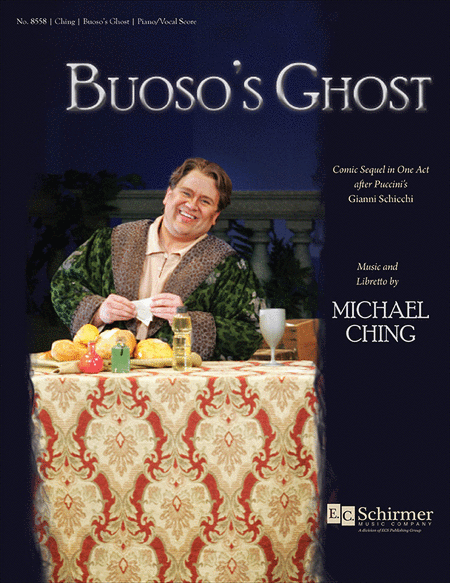 | Composed by Michael Ching.
One Act/Chamber Opera. 20th
Century. Score. Published by
E.C. Schirmer Publishing Arr : Piano, VoicePublisher : Schirmer$27.00 - See more - Buy online

Sheet music extract
Sheet music extract 
Music and Libretto:
Composed and written by Michael Ching.
Roles:
LAURETTA Soprano
RINUCCIO Tenor
SCHICCHI Baritone
FRAIR I* Tenor (Comprimario)
FRIAR II* Baritone (Comprimario)
NELLA Soprano
LA CIESCA Mezzo Soprano
ZITA Mezzo Soprano or Contralto
GHERARDO Tenor
MARCO Baritone
BETTO Baritone
SIMONE Bass or Bass Baritone
THE MAGISTRATE* Baritone (Supporting)
SUPERNUMERARIES
THE MAGISTRATE'S GUARDS/RETAINERS, GHERARDINO (Child)
THE LATE UNCLE BUOSO
*character not in Gianni Schicchi
Instrumentation:
2 1 2 1 - 2 2 1 - perc - hp, synth - str
Premier:
January 25, 1997, Opera Memphis
Notable Performances:
Pittsburgh Opera Center at Dusquesne (1996)
Opera Memphis (1997)
Indianapolis Opera (1999)
Chicago Opera Theater (2000)
Triangle Opera (2000)
Texas State University (2005)
McGill University (2005)
Opera New Jersey (2006)
Opera Saratoga (2008)
Amarillo Opera (2010)
Southern Utah University (2010)
Bayview Music Festival (2011)
UNC-Chapel Hill (2014)
SUNY Potsdam (2017)
OperaDelaware (2018)
University of Central Florida (2018)
Synopsis:
A sequel to Gianni Schicchi by Giacomo Puccini (1858-1924), Buoso's Ghost begins with the final bars of Gianni Schicchi. As the sequel begins, we see Lauretta and Rinnuccio, arm in arm, planning their future. Feeling the proud father, Schicchi, looks on. The couple go off to buy their wedding ring. Alone, Schicchi straightens up the house. He sees some food and wine that the relatives have brought and sits down for a snack. But he discovers that the food and drink have all been poisoned by the relations.
He is interrupted by a knock at the door. Two brothers have come to collect on Buoso Donati's will. Schicchi shows them the "revised" document and they leave in shock. Alone, Schicchi imagines the relatives making their plans to poison old Uncle Buoso.
We hear the relatives approaching. Quickly Schicchi scribbles a note and tucks it into Buoso's nightshirt. They have come screaming for blood. Just as they are about to beat Schicchi senseless, a magistrate arrives to try the case.
The relatives immediately assume an air of mourning. Then they angrily accuse Schicchi of murdering uncle Buoso. Schicchi beseeches them for mercy. He sneaks up to each one and tells them that he knows that they have poisoned Buoso's food and drink. They are stunned and worried. They quickly switch gears. Each group of relatives offers Schicchi a bribe if he will blame somebody else, but Schicchi makes no promises.
The magistrate brings everyone back to order. When Old Simone refuses to accuse Schicchi, then the magistrate does it himself. Schicchi defends himself, keeping the relatives on pins and needles. Finally, sobbing he goes over to Uncle Buoso's body and falls on the corpse. He pulls out the note and reads it: Uncle Buoso has committed suicide. All are shocked at this horrible sin. The magistrate is miffed that he can't condemn Schicchi and leaves.
Alone, the relatives realize that Schicchi has outwitted them again. Jokingly, Betto says that they will get the money back in the long run because Rinnuccio and Lauretta are getting married. They realize they can just kill Schicchi now and inherit everything.
Overhearing this, Schicchi prepares. He hides behind the body and blows out the candles. He summons the ghost of Buoso Donati and scares the family from the house.
In an echo of the end of the Puccini opera, Schicchi comes downstage and asks the audience to forgive the upstart composer for writing the sequel. Duration: 50 minutes
Opera New Jersey, 2006 - Jeff Reeder
Reviews:
Buoso's Ghost soared .... [it] offered highly charged acting atop a deft, tuneful score.... Ching, General/Artistic Director of Opera Memphis, studied with Robert Ward and Carlisle Floyd, and the unashamed flow of natural, singing melody ... reflects the profile of his teachers.
-Chicago Sun-Times
Composer and librettist Ching ... borrows snatches of Puccini tunes and weaves them into his own conservative-eclectic idiom, tossing in bits of American pop ... for merry measure. The vocal writing is expert, the orchestration light enough to allow the singers to project the text clearly. Buoso is charming and unpretentious ....
-Chicago Tribune
[Ching uses] a more modern musical mode, yet avoiding excessive atonality. The score subtly introduces brief tongue-in-cheek quotations from other works, ranging from Mozart to Sondheim, plus one unmistakable interjection of Shostakovich.
-Opera News |
|

 (AMERICAN COMPANY)
(AMERICAN COMPANY) 

